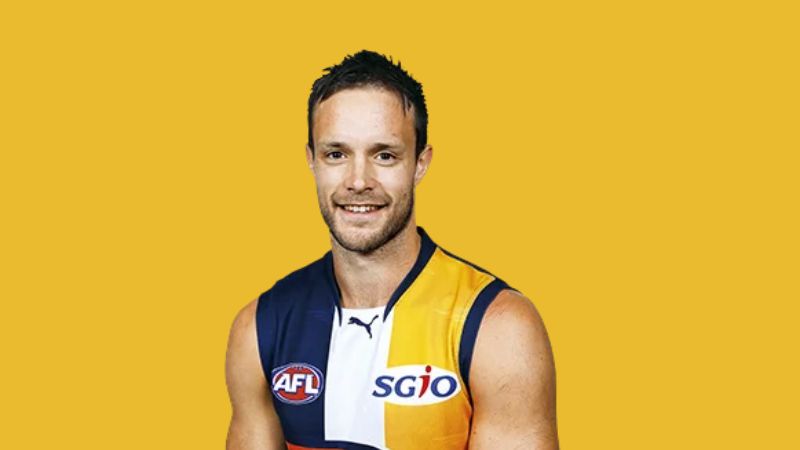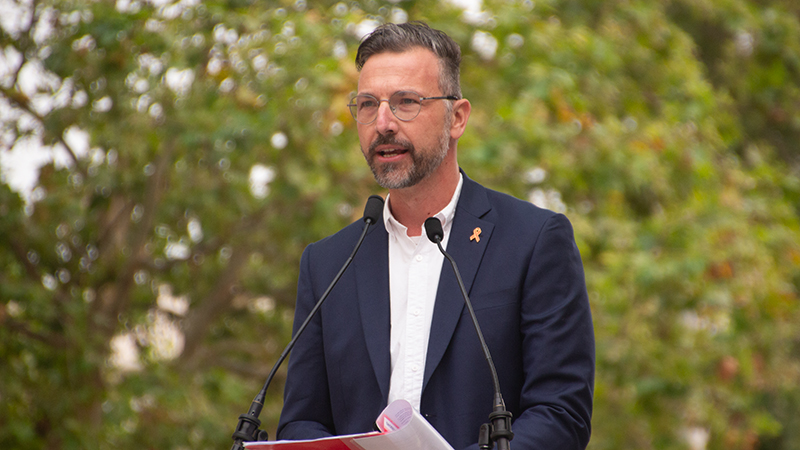Former West Coast Eagle Mitch Brown has shared that he is bisexual. He is the first-ever male AFL player who has played in the top division to publicly share they are same-sex attracted.
In a landmark interview with The Daily Aus Brown shared that his sexuality played a big part in his decision to retire in 2016. Brown played 94 games for the West Coast Eagles between 2007 and 2016.
In the game’s 129 year history there has never been a top level player who has publicly identified as being gay or bisexual, and in recent months the sport has been dealing with the ongoing occurrences of players using homophobic language on the field.

In the interview Brown shared that when he joined the West Coast Eagles as a draftee in 2006 he found it to be a “hyper-masculine environment”.
He shared that when he first spoke to a team mate about sexuality, asking “how do you know if you’re gay, how do you know if you’re bisexual?” His question was laughed off.
“It was almost like, ‘that’s a funny question. You’re being funny, Mitch.’ And then the conversation just rolled on. But it was made [into] a joke, and I remember how that made me feel, and I swore never to bring that up ever again.”
He said he became “very, very good,” at hiding parts of himself.
“Not just about my sexuality, but… everything. My anxiety, my worries in life. I could bury them so deep,” Brown told The Daily Aus.
He detailed how he found the AFL’s culture of hyper-masculinity was one that created an environment where questioning or exploring your sexuality was impossible.
“It was never once an opportunity to speak openly or explore your feelings or questions in a safe way.” he said.
Brown also shared his experience of witnessing overt homophobia among his team mates, and he detailed that calling someone “gay” was seen as the ultimate insult.
He recalled sitting in a sauna next to six team mates when the topic of gay players in the AFL came up.
“I remember two people having a conversation around how they would feel having a shower next to a gay man, and one of the players said, ‘I’d rather be in a cage full of lions than have a shower next to a gay man,'” Brown said.
“There’s been so many times in my life that I’ve seen things or heard things and not said anything, in fear of people thinking that I was gay or bisexual.”
Brown said that while his retirement was partly due to injury, he also wanted to get out into the world and meet a more diverse range of people.
In the interview he also discussed being bisexual and how there’s also a rejection of bisexual people from some gay men. Brown was previously married to netballer Shae Bolton and the couple have two young children. He shared that he is currently in a relationship with a woman.
Brown said that while he’s the first player to come out publicly, he hopes it creates a safe space for more to follow.
Mitch Brown’s announcement receives widespread praise
Brown’s decision to share information about his sexuality has received widespread praise.
WAAC (formerly, Western Australian AIDS Council) expressed its support, noting that through their work in supporting young Western Australians via the Freedom Centre, they recognised the positive effect the announcement would have.

“We know that representation matters,” WAAC CEO, Dr Daniel Vujcich said.
“When young LGBTIQA+ people see someone like Mitch in public life, it sends a powerful message that they too can be authentic and successful in their chosen fields. However, the responsibility for change lies not with individuals to come out, but with institutions and communities to create environments where all LGBTIQA+ people feel valued and protected.
“We encourage all sporting organisations, workplaces, and educational institutions to reflect on Mitch’s story and consider how they can better support LGBTIQA+ individuals in their communities, whether they are publicly out or not,” he said.
Pride Cup CEO Hayley Conway called Brown’s announcement “an incredible significant moment” for both the LGBTQIA+ and AFL communities.
“We know that the harrowing experiences that Mitch has shared with us today continue to be experienced in sports clubs across the country,” Conway said.
“This makes it even harder for young gay and bisexual men to live and play as their true selves.
“When clubs create safe and inclusive environments, everyone thrives. Every sports club, at every level, should be asking: ‘How are we creating a place where any player can be at their best and feel like they belong?’
“Education for players, administrators, coaching staff, broadcasters and commentators should be compulsory so that we can build cultures that celebrate all of our identities and make sport a better place for everyone.”
Health Equity Matters CEO, Dash Heath-Paynter also praised Brown’s announcement.
“Today is a historic moment, not just for the AFL, but for our entire nation and for LGBTIQA+ people across Australia.” Dash-Paynter said.
“Mitch Brown’s story demonstrates strength and honesty. Speaking openly about his sexuality in the context of elite Australian sport is inspiring and will give confidence to many Australians confronting similar questions of identity.
“For over a century of AFL competition, no male player has identified as openly bisexual or gay. Mitch’s announcement breaks through decades of silence and opens the door for others who may be on their own journey.
“This is a powerful statement about visibility and inclusion. For LGBTIQA+ young people watching today, Mitch is showing them that they belong in every space, including in the nation’s most followed sporting code.
“Mitch’s announcement reflects the contemporary reality of broader Australian society. However, it also reminds us there is still work to be done to ensure all sporting codes in Australia are inclusive and safe spaces for LGBTIQA+ people. As the AFL approaches its finals season, we would urge them to grasp the opportunity offered by Mitch’s strength. The AFL must be do some deep thinking about the measures needed to make the code safe and inclusive for players, officials and volunteers.” the health leader said.
“When public figures like Mitch share their stories, it smashes down barriers, builds confidence, and creates pathways for others to be the person they want to be.
“We commend Mitch for his strength and candour and thank him for using his platform to advance inclusion and diversity in Australia. His announcement today will resonate far beyond the sporting world and contribute to a more equitable Australia for all LGBTIQA+ people.”
Calls for AFL to continue working on improving culture
The AFL is being called on to continue focussing on efforts to reduce homophobia within their ranks.
Restorative justice expert Renee Handsaker said the examples of homophobia, racism and sexism seen in the sport are a reflection on wider society.
Handsaker is the manager of the RMIT Centre for Innovative Justice ‘Open Circle’ restorative justice service and specialises in restorative conferencing, conflict transformation and debriefing following traumatic incidents.
“Australian football culture is a powerful reflection of the homophobia, racism and sexism that exist in broader Australian society.
“But the AFL can drive much needed societal change. It has an opportunity, and perhaps an obligation, to introduce transformative and beneficial responses to the experience of oppression and violence faced by marginalised communities.” Handsaker said.
The researcher recognised that the AFL had implemented many strategies to target unwanted behaviours, but said more work was needed.
“Despite efforts to enforce codes of conduct, pride rounds, and match bans for homophobic slurs, the measures in place are not effectively fostering an environment where individuals feel safe to express their true selves.
“In my work as a restorative justice facilitator, I am always interested in the context and power relations that exist around an act of violence or vilification.
“An appropriate response by the AFL could centre on meaningful accountability for harmful actions, while also acknowledging systemic and individual experiences of oppression, can guide more compassionate – and more beneficial – outcomes.” the said.





